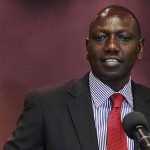NAIROBI, Kenya – Ngũgĩ wa Thiong’o, the Kenyan novelist, playwright, and essayist whose work reshaped African literature and challenged colonial and postcolonial power structures, died on May 28 in Buford, Georgia. He was 87.
His daughter, Wanjiku wa Ngũgĩ, confirmed his death in a Facebook post, writing, “He lived a full life, fought a good fight.”
Born James Ngugi on January 5, 1938, in Kamiriithu, Kenya, Ngũgĩ was raised during British colonial rule and the Mau Mau uprising. His early experiences with colonialism deeply influenced his writing and political activism.
He later renounced his Christian name and committed to writing in his native Gikuyu language, emphasizing the importance of African languages in literature and culture.
His debut novel, Weep Not, Child (1964), was the first English-language novel published by an East African writer. Subsequent works like The River Between (1965), A Grain of Wheat (1967), and Petals of Blood (1977) cemented his reputation as a leading literary figure. In 1986, his influential essay collection Decolonising the Mind argued for the use of indigenous languages in African literature, challenging the dominance of European languages and perspectives.
Ngũgĩ’s political activism led to his imprisonment in 1977 after the performance of his play Ngaahika Ndeenda (I Will Marry When I Want), which criticized the Kenyan government.
While incarcerated, he wrote Devil on the Cross on prison-issued toilet paper. Following his release, he went into exile, living and teaching in the United States, including at the University of California, Irvine.
His later works continued to explore themes of oppression and resistance, with Wizard of the Crow (2006) being hailed as a masterpiece of postcolonial literature. Throughout his career, Ngũgĩ received numerous accolades and was frequently mentioned as a potential Nobel laureate.
Ngũgĩ is survived by his wife, Njeeri, and their children, several of whom have followed in his literary footsteps. His legacy endures through his writings and his unwavering commitment to cultural and linguistic decolonization.





